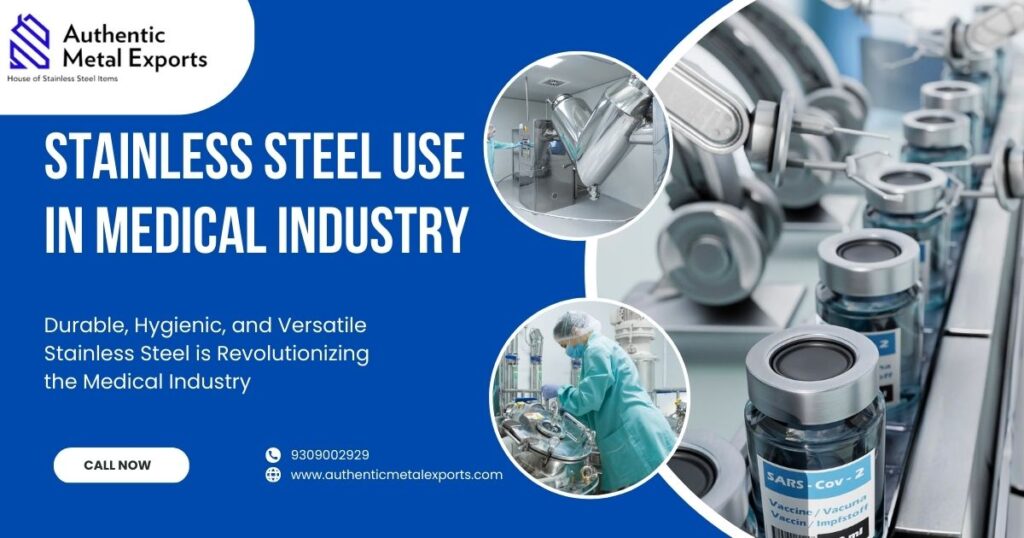The Benefits of Using Stainless Steel in the Medical Industry
When it comes to choosing materials for medical equipment, the stakes are high. Not only does the equipment need to be reliable and effective, but it also needs to be safe for patients and medical staff alike. This is where stainless steel shines.
In this article, we will explore the many benefits of using stainless steel in the medical industry, from its durability to its antimicrobial properties.
Durability and Strength
One of the main advantages of using stainless steel in medical equipment is its durability and strength. Medical equipment needs to be able to withstand constant use, sterilization, and handling.
Stainless steel is a highly durable material that is able to withstand harsh environments and frequent use without corroding or breaking down. This makes it an ideal material for medical equipment that needs to last for years without losing its effectiveness.
Resistance to Corrosion
Stainless steel is highly resistant to corrosion, which is a crucial factor in the medical industry. Medical equipment needs to be sterilized regularly to prevent the spread of infections and diseases.
This sterilization process can be harsh on equipment, but stainless steel is able to withstand repeated exposure to harsh chemicals without corroding or deteriorating. This means that medical equipment made from stainless steel is able to maintain its integrity and functionality even after multiple rounds of sterilization.
Easy to Clean and Maintain
In addition to being highly durable and corrosion-resistant, stainless steel is also easy to clean and maintain. Medical equipment needs to be kept clean and free of bacteria to prevent the spread of infections Because stainless steel is non-porous, bacteria cannot penetrate its surface
This makes it easy to clean and sanitize, reducing the risk of infection and making it a more hygienic option for medical equipment.
Antimicrobial Properties
Stainless steel also has antimicrobial properties that make it an ideal material for medical equipment. These properties are inherent in the material itself and are not achieved through the use of coatings or additives.
This means that the antimicrobial properties of stainless steel are long-lasting and effective. Stainless steel has been shown to inhibit the growth of bacteria, viruses, and fungi, making it a safe and hygienic material for medical equipment.
Versatility
Stainless steel is a highly versatile material that can be used in a wide range of medical applications. It is used in everything from surgical instruments to medical implants to hospital furniture.
Stainless steel is also compatible with other materials, making it easy to combine with other materials to create hybrid medical equipment.
Cost-Effective
While stainless steel may be more expensive upfront than other materials, it is ultimately a cost-effective choice for medical equipment.
Its durability and resistance to corrosion mean that it does not need to be replaced as often as other materials, reducing the long-term costs of maintenance and replacement.
Additionally, its easy-to-clean and antimicrobial properties can help reduce the risk of infections, which can result in significant cost savings over time.
Using Stainless Steel in the Medical Industry: Applications
Stainless steel has a wide range of applications in the medical industry, from surgical instruments to medical implants to hospital furniture. In this section, we will explore some of the specific ways that stainless steel is used in the medical industry.
Surgical Instruments
Surgical instruments are one of the most common applications for stainless steel in the medical industry. Surgical instruments need to be highly durable, corrosion-resistant, and easy to sterilize.
Stainless steel is able to meet all of these requirements, making it an ideal material for surgical instruments. Common surgical instruments made from stainless steel include scalpels, forceps, scissors, and retractors.
Medical Implants
Stainless steel is also used in medical implants, such as pacemakers, joint replacements, and dental implants. These implants need to be able to withstand the harsh environment of the human body without breaking down or corroding.
Stainless steel is a highly biocompatible material that is able to meet these requirements. Additionally, its antimicrobial properties can help prevent infections and improve patient outcomes.
Hospital Furniture
Stainless steel is also commonly used in hospital furniture, such as beds, cabinets, and tables. Hospital furniture needs to be highly durable and easy to clean to prevent the spread of infections.
Stainless steel is able to meet these requirements, making it a popular choice for hospital furniture. Additionally, its sleek and modern appearance can help create a clean and professional look in medical facilities.
Hybrid Medical Equipment
Stainless steel is also compatible with other materials, making it easy to combine with other materials to create hybrid medical equipment.
For example, stainless steel can be combined with plastic to create medical tubing or with ceramics to create dental implants.
This versatility makes stainless steel a highly useful material for the medical industry.
Conclusion
Stainless steel is a highly beneficial material for use in the medical industry. Its durability, resistance to corrosion, easy-to-clean properties, antimicrobial properties, versatility, and cost-effectiveness make it an ideal choice for medical equipment
The medical industry requires equipment that is reliable, effective, and safe for patients and medical staff alike. Stainless steel is able to meet all of these requirements, making it a top choice for medical professionals around the world.
Authentic Metal Exports
Address :– 1/10, Asaf Ali Road, Opposite Kamla Market, Ajmeri Gate, New Delhi- 110002
Call Now: 9309002929
Chat on WhatsApp:- 9309002929, 9289792929







Pingback: Industrial Applications Of Stainless Steel: Benefits And Advantages |
Pingback: The Fascinating Science Behind The Production Of Stainless Steel |